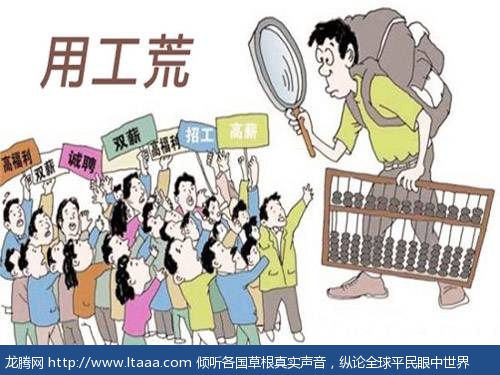日企争抢频繁跳槽者应对用工荒(翻译完结) [日本媒体]
东京报道——随着日本经济急剧老化, 各企业纷纷全力网罗那些有经验的员工。 这一波用工荒导致频繁跳槽者达到了全球经济危机以来的最高峰。
Japan Inc scrambles for job-hoppers to cope with labor shortages
By Tetsuhi Kajimoto | TOKYO
日企争抢频繁跳槽者应对用工荒
——东京记者梶本哲司报道
TOKYO - Japan's labor shortage has pushed job-hopping to its highest since the global financial crisis, as companies scramble for workers with experience in the rapidly-ageing economy.
东京报道——随着日本经济急剧老化, 各企业纷纷全力网罗那些有经验的员工。 这一波用工荒导致频繁跳槽者达到了全球经济危机以来的最高峰。
Job-hopping goes against the grain of Japan's work culture, where many companies hire graduates and employ them until they retire. But the country's jobs-for-life system is slowly giving way as firms curb labor costs and society shifts.
频繁跳槽和日本文化是背到而驰的。大多数日本企业聘请员工从毕业生开始, 一直保持雇佣关系直到员工退休。 然而由于后来企业采取的控制用工成本措施,以及整个社会风气的改变, 日本的终身雇佣体系渐渐面临着土崩瓦解的局面。
Switching jobs for better conditions is no longer taboo amid a tightening labor market, and the trend is being led by mid-career workers.
在日渐紧俏的工作市场上, 换工作不再是职场禁忌。 目前职场的中坚员工正在引领这一风潮。
"There's always a risk of failure. But you can't get what you want if you don't try," said Hiromichi Itakura, 44, head of a medical job placement department at Saint Media Inc in Tokyo, who changed jobs in January.
"I took up this job because it gives me a more responsible post. As a salary man, I also wanted a higher salary," he said, adding that his pay is now 20 percent higher than previously.
44岁的板仓裕道是东京圣米迪亚实习生排位部的领导。 他在一月份刚换了工作。 “换工作一定会有风险。但是如果你不尝试,就没有办法得到自己想要的东西”,板仓解释道,“我接受了这份新工作是因为这个岗位更有责任感。 作为一名工薪族, 我也想要更高的薪水”。 他还补充说自己的薪水比以前涨了百分之20。
The number of job-hoppers rose for the seventh straight year to 3.06 million in 2016, the highest since 2009, though it still accounts for just 4.8 percent of the labor market.
频繁跳槽者在2016年人数达到三百零六万, 这是自2009年以来7年里的最高值。 尽管如此,他们的人数只占劳工总人口的百分之4.8。
Older workers have more opportunities because of demographics: a fast-ageing society, low birth rate and falling working-age population. The jobless rate has stood at a near two-decade low while the jobs-to-applicants ratio is at a 43-year high.
在这个急剧老化, 出生率低迷, 工作人口不断减少的社会里, 由于人口社会等因素, 年长员工拥有了更多的选择机会。 目前的失业率处于二十年以来的低谷, 同时工作岗位和求职人数的比率达到了43年的最高峰。
Big firms say the labor market is at its tightest since 1992, according to the Bank of Japan's latest "tankan" survey published this week.
根据日本央行本周发布的《短观报告》,大企业表示它们正在经历自1992年以来最为严峻的用工荒。
Though job turnover is still low relative to other major economies - the change should be welcome news to Prime Minister Shinzo Abe, who has been championing labor flexibility and merit-based pay - with little success so far.
尽管跟世界其他主要经济体相比, 日本的跳槽率还很低, 但这种改变对于首相安倍晋三来说应该算是一个好消息。 安倍一直以来都在倡导提高职场灵活性,鼓励用高工资奖励优秀员工。 到目前为止, 他的政策并没有取得多少成功。
Enhancing labor mobility is expected to help raise low productivity and boost wages, getting Japan convincingly out of a deflationary rut.
日本希望提高职场流动性可以帮助提高低下的生产率, 刺激工资增长, 以摆脱经济紧缩的桎梏。
COMPETITION FOR WORKERS
企业对工人展开争夺战
Companies facing labor shortages are willing to pay for battle-tested workers who don't need as much training.
面临用工短缺的公司现在愿意用高工资招募有实战经验、无需长期培训的员工。
Electric motor maker Nidec Corp is actively hiring mid-career engineers and remunerating them for their experience.
电机制造商日本电产株式会社目前正积极用高薪招聘经验丰富的的工程师。
"Competition is tough for tried-and-true personnel," a company spokesman said on condition of anonymity. "We are doing our best to persuade talented people to join our company."
一个匿名的公司发言人称:“大家都想找经验丰富的人才,竞争激烈。我们尽最大的努力说服人才加入我们公司。”
Job-hoppers aged between mid-40s and 65 or older are on the rise, hitting their highest, according to comparable data going back to 2002.
同2002年的数据相比,40多岁到65岁甚至更年长的跳槽者人数达到最高点。
"The mid-career job market is booming," said Hirofumi Amano of en-japan inc, a job placement agency.
在日本一家招聘机构从业的天野博文谈到:“职场中坚人员的招聘市场正在飞速增长”。
People older than 35 used to be considered past their prime in the mid-career market but these workers are now sought after. Companies are seeking experienced managers and engineers and offering higher pay, Amano said.
他说, 人们以前认为35岁以上的员工已经过了他们的高峰期, 但是现在这些人变得很枪手。 用工企业现在盯准这些经验丰富的管理人员和工程师, 并用更高的薪水招揽他们。
Workers who secured higher salaries from changing jobs outnumbered those whose paychecks shrank, labor ministry data from 2015 showed. A quarter of job-hoppers saw their salaries rise by 10 percent or more.
In comparison, average base wages in April rose just 0.4 percent from a year earlier.
2015年劳工部的数据显示, 通过换工作薪水增长的员工远超过那些薪水下降的人。 四分之一的人跳槽后薪水增长了百分之10甚至更多。 相比较之下,四月份的全国平均工资只比去年增长了百分之0.4.
The International Monetary Fund has urged Japan to enhance worker mobility to strengthen productivity and wage pressures.
国际货币基金组织敦促日本提高职场流动性, 借以提高生产效率,并给企业施压提高工资水平。
"Low labor mobility, a strong preference for job security, and wage setting based on past inflation constitute the main bottlenecks for triggering needed wage-price dynamics."
低的劳动流动率,对就业保障的强烈偏好以及根据过往通胀设定工资等因素导致所需的工资与物价动态无法发生。
NEW ATTITUDE
新观念
The rising mid-career job market reflects Japan's changing business climate and evolving attitudes about lifetime employment and seniority-based promotion, analysts say.
分析家认为,职场中坚人员日益增加的工作机会反映了日本正在改变的商业环境,也反映了人们对于终身雇佣制和按资排辈的晋升机制发生了观念上的转变。
"Look what happens to even big firms like Toshiba, there's no guarantee for job security. Lifetime employment is something of the good old past," said Masae Miyachi, 41, of an IT venture company kaonavi, inc.
“看看那些大企业比如东芝是怎么做的。根本就没有什么职业保障。 终身雇佣制虽然好, 但已经是过去式了。”41岁在IT企业考纳威就的职宫内正惠这样认为。
Miyachi changed jobs a year and half ago and her annual salary has now increased by 1 million yen ($8,857), helping her finance a home loan. "You need to carve out a career for yourself to earn stable income, and I'm doing just that by changing jobs."
宫地在一年半之前换了工作。 她现在的年薪增加了一百万日元(8857美元)。 这样的年薪让她能够负担地起房屋贷款。 “你要为自己创立一番事业,谋求稳定的收入。我换了工作就达到了这个目的。”
Japanese firms have curbed labor costs by replacing full-time jobs with part-time positions since the asset-inflated bubble burst in the early 1990s.
日本企业在九十年代初地产泡沫崩溃之后,为了节省人力成本用临时岗位取代了很多全职工作。 这导致今天劳工市场的将近百分之40都是非全职工, 包括临时工和合同工 。
Now a rising rank of non-regular workers - including part-timers and contract workers - account for nearly 40 percent of the workforce.
Hiroaki Okutani, a 57-year-old contract worker at a logistics company Ueda Co Ltd, who left his job at a food processing firm two years ago, said his decision was partly due to anxiety about life after retirement.
奥谷博明今年57岁。 他两年期离开了食品加工厂, 成为物流企业UEDA株式会社的一名合同工。 他说自己在某种程度上是担心退休后的生活才做出了这个决定。
"There's no compulsory retirement with this job," Okutani said. "I'm happy working here as long as my body holds up because I don't think I can live on my pension alone."
奥谷说, “这份工作没有强制退休年龄, 所以只要我身体还撑得住, 就愿意在这里继续做下去, 因为我觉得靠那点养老金根本就养活不了自己。”
版权声明
我们致力于传递世界各地老百姓最真实、最直接、最详尽的对中国的看法
【版权与免责声明】如发现内容存在版权问题,烦请提供相关信息发邮件,
我们将及时沟通与处理。本站内容除非来源注明五毛网,否则均为网友转载,涉及言论、版权与本站无关。
本文仅代表作者观点,不代表本站立场。
本文来自网络,如有侵权及时联系本网站。
图文文章RECOMMEND
热门文章HOT NEWS
-
1
最近,新冠肺炎疫情在日本有扩大的趋势,有专家呼吁日本应当举国行动起来,共...
- 2
- 3
- 4
- 5
- 6
- 7
- 8
- 9
- 10
推荐文章HOT NEWS
-
1
最近,新冠肺炎疫情在日本有扩大的趋势,有专家呼吁日本应当举国行动起来,共...
- 2
- 3
- 4
- 5
- 6
- 7
- 8
- 9
- 10











